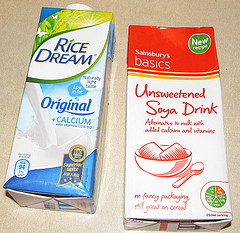
flic.kr/fEcQgF
An emulsifying substance, lecithin has been touted for years as a wonder food, replete with countless medical benefits, among them is having positive lecithin side effects on persons combating multiple sclerosis, cirrhosis of the liver, tremors, atherosclerosis, gall stones, psoriasis, eczema, scleroderma, anxiety, and brain aging. But what is lecithin? Now we ask, why does it have all these lecithin side effects?
Lecithin, as chemical
Lecithin is mainly made up of a compound known as phosphatidylcholine, which is one of a group of fat soluble phospholipids within the compound. In chemistry, the term lecithin is even used interchangeably with phosphatidylcholine, though most commercial lecithins (especially those derived from soybean) contain only about 20% of the compound.
The chemical substance lecithin is discovered in all living organisms, specifically comprising the cell membrane and other membranes of organelles inside the cell itself. It is also a main component of the myelin sheath, which is the thin covering that envelopes brain neurons and our nerves.
The unique structure of lecithin plays a major role in the protection of our body from the destructive effects of oxidation. It also aids in the digestive processes through the action of bile which contains lecithin produced by the liver. There have been studies that reveal how lecithin could also have positive lecithin side effects on persons with high blood cholesterol level, appearing to lower it down.
Lecithin, as wonder food
Not like other chemical substances such as carbohydrates, proteins, fats and oils, lecithin is actually not an essential nutrient. Well, yes, it does do wonders for the body, but a deficiency in lecithin will not make life bad for you. In addition, it is not like you are going to run out of lecithin anytime soon. You can always get your supply of lecithin from the foods that you eat, like eggs (yolks), sunflower, soybeans, grape seed, wheat germ, to name a few.
Lecithin has been the subject of different extensive research studies, particularly concerning its role in degenerative diseases. Because of its being a key component in the structure of myelin sheath and nerve cells, scientists believe that lecithin side effects include a possible cure for conditions involving cognition or those that affect the mental processes used to acquire, maintain, retrieve, and utilize information.
One clear example is dementia, which is a mental condition that may be due to stroke. It has been experienced that people who suffer from this condition often have a low level of a natural chemical known as acetylcholine. Acetylcholine is one of the chemical compounds found in lecithin. This compound is, in fact, a neurotransmitter that affects the muscles and memory. The lecithin side effects of supplements, the signs of dementia may be improved by increasing the levels of acetylcholine in the body.
Another example of the wonders of lecithin side effects is its ability to lower cholesterol levels in the blood. A small study of individuals with normal or mildly elevated cholesterol levels revealed that lecithin supplementation decreased both the absorption of cholesterol from foods and the production of low density lipoproteins or LDL cholesterol (the “”bad”” type of cholesterol).
Tagged with: lecithin benefits • lecithin overview
Filed under: Lecithin